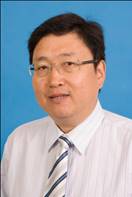各位老师,各位同学:
以下是一则学术报告信息,请有兴趣的老师、同学前往参加。
报告题目: Nanostructured Electrocatalysts for Energy Conversion
报告时间: 2017-6-23 15:00 (周五)
报告地点: 材料学院大会议室(实验1楼)
报 告 人: Shizhang Qiao 教授(Journal OF Materials Chemistry A 副主编,澳大利亚阿德雷德大学纳米技术首席教授)
祝好!
顾金楼
Abstract:Replacement of precious metal catalysts by commercially available alternatives is of great importance among both fundamental and practical catalysis research. Nanostructured carbon-based and transition metal materials have demonstrated promising catalytic properties in a wide range of energy generation/storage applications. Specifically engineering carbon with guest metals/metal-free atoms can improve its catalytic activity for electrochemical oxygen reduction reaction (ORR), oxygen evolution reaction (OER) and hydrogen evolution reaction (HER), thus can be considered as potential substitutes for the expensive Pt/C or IrO2 catalysts in fuel cells, metal-air batteries and water splitting process. In this presentation, we will talk about the synthesis of nonprecious metal and metal free elements-doped carbon, and their application on electrocatalysis [1-6]. The excellent ORR, OER and HER performance (high catalytic activity and efficiency) and reliable stability (much better than the commercial Pt/C or IrO2) indicate that new materials are promising highly efficient electrocatalysts for clean energy conversion.
References:
[1] Y. Zheng, S.Z. Qiao et al., J. Am. Chem. Soc. 2017, 139, 3336-3339.
[2] Y. P. Zhu, S.Z. Qiao et al., Angew Chem Int Ed. 2017, 56, 1324-1328.
[3] Y. Jiao, S.Z. Qiao et al., Nature Energy, 2016, 1(10), 16130.
[4] T. Ling, S.Z. Qiao et al., Nature Communications, 2016, 7, 12876.
[5] Y. Zheng, S.Z. Qiao et al., J. Am. Chem. Soc. 2016, 138, 16174-16181.
[6] T.Y. Ma, S.Z. Qiao et al., Angew. Chem. Int. Ed.2016, 55, 1138
Speaker: Prof. Shi-Zhang Qiao is currently a professor (Chair of Nanotechnology) and Australian Laureate Fellow at School of Chemical Engineering of the University of Adelaide, Australia. His research expertise is in nanomaterials and nanoporous materials for new energy technologies including electrocatalysis, photocatalysis, fuel cell, supercapacitor and batteries. He has co-authored more than 295 papers in refereed journals (24,900 citations with h-index 83), including Nature, Nature Materials, Nature Energy, Nature Communications, J. Am. Chem. Soc, Angew. Chem., Adv. Mater. He has filed several patents and has attracted more than 11 million dollars in research grants from industrial partners and Australian Research Council (ARC).
In recognition of his achievements in research, he was honoured with a prestigious ExxonMobil Award (2016), ARC Discovery Outstanding Researcher Award (DORA, 2013), Emerging Researcher Award (2013, ENFL Division of the American Chemical Society) and UQ Foundation Research Excellence Award (2008). He has also been awarded an ARC ARF Fellowship, an ARC APD Fellowship and an inaugural UQ Mid-Career Research Fellowship.
Prof Qiao is currently appointed to ARC College of Experts. He is an Associate Editor of Journal of Materials Chemistry A (RSC), Editorial Board member of ChemBioEng Review (Wiley), Energy Storage Materials (Elsevier) and Advisory Board member of ChemNanoMat (Wiley), Journal of Materials Science & Technology (Elsevier), Small Methods(Wiley) and Advanced Materials Technologies (Wiley). He is a Fellow of Royal Australian Chemical Institute Chartered Chemist (FRACI CChem) and a Fellow of Royal Society of Chemistry (FRSC). Prof. Qiao is a Thomson Reuters Highly Cited Researcher.
